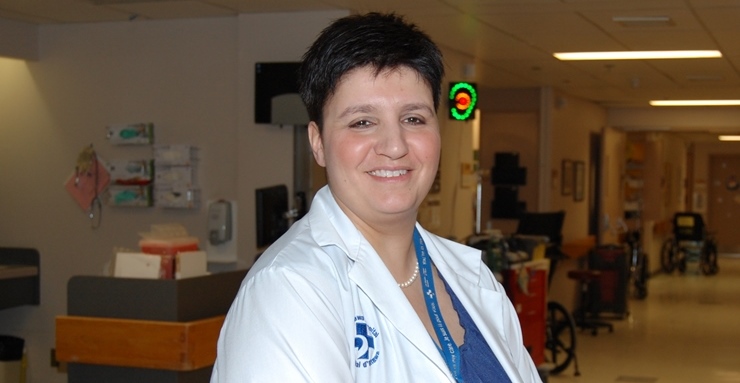
Anji Bhattacharyya, Clinical Manager of 5East, said the SoundEar helps staff to be aware of noise levels from the patients’ perspective.
Whether you have a cold, an injury or a serious illness, there is one piece of advice that always applies: if you want to get better, you need to rest.
Research shows that a quiet, restful environment at night improves patient experience, speeds healing, promotes recovery and reduces pain. But a busy hospital can be as loud at night as it is during the day.
“You can just imagine: you’re drifting off to sleep and there’s an announcement blaring, the rattle of equipment, chatter in the hall,” said Anji Bhattacharyya, Clinical Manager of 5East at The Ottawa Hospital. “On busy nights, for patients it can feel and sound like the middle of the day. We need to see it from their perspective and be aware.”
5East took part in a pilot project last year to provide a visual reminder of noise levels. A “SoundEar” mounted in the hallway shows green lights when noise levels are low, and yellow and red as they increase.
Although the ear doesn’t record noise or conversations, it tracks how noise levels rise and fall throughout the night.

The SoundEar is a visual reminder of noise levels on units.
The ear took some getting used to, said Bhattacharyya, but it sparked a heightened awareness of noise levels among unit staff members.
“We talked about it at staff meetings. Change is always hard, but our staff wants to provide the best care.”
Over the past year, the hospital has made progress in eliminating unnecessary announcements and identifying trouble spots. There’s still work to be done, but Bhattacharyya said that patients are giving her positive feedback.
“On this unit, it’s not unusual that patients come to us several times. I ask about noise when we round on patients. They’ve mentioned that it was quieter, that they got more sleep.”
How can you promote quiet at night for your patients?
- Keep patients’ rooms dark.
- Consider closing doors.
- Offer ear plugs.
- Speak softly.
- Minimize waking patients.
- Do your patient-care tasks in clusters.
- Ask patients how well they slept.
- Help patients resolve sleep problems.
| See related story: Could you sleep with noise like busy traffic? |

Support patient care and research at
The Ottawa Hospital


 To reset, hold the Ctrl key, then press 0.
To reset, hold the Ctrl key, then press 0.